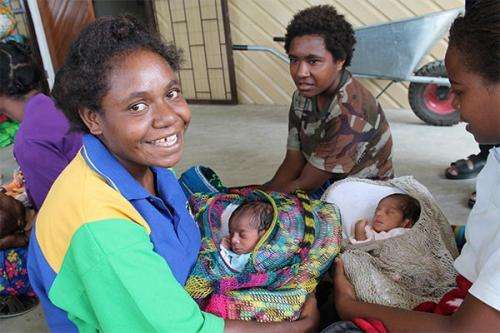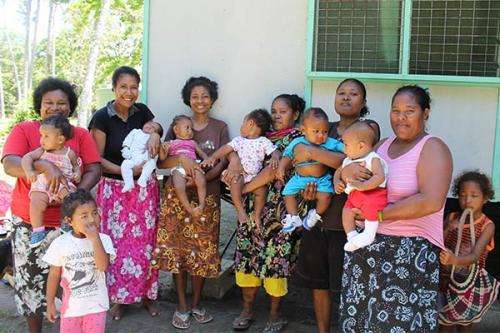Midwifery's re-birth in PNG

A $10 million maternal and child health initiative in Papua New Guinea (PNG), led by the UTS World Health Organization's Collaborating Centre for Nursing, Midwifery and Health Development (WHO CC) and funded by the Australian Government, is beginning a new phase this year. While proving highly successful in raising the quality of midwifery education in PNG, it still faces many challenges in helping end our neighbour's high rates of maternal and child death.
In a crowded Port Moresby hospital ward, just one hour north of Australia, a midwife attends to a young woman giving birth. As any caring professional would, she prays for no complications. However, troubled birth or not, the midwife knows she won't have time to stay until the end of the procedure. With only rudimentary supplies and equipment on hand, she will see over twenty mothers-to-be that day, many of them lined up in the corridor outside.
When Adjunct Professor Pat Brodie first visited PNG 15 years ago, she was shocked to say the least.
"It was very confronting. Essential supplies such as water, gloves, electricity – as well as any degree of privacy – were all extremely deficient. It was the equivalent of many third-world situations."
Returning in 2010 as an advisor for the World Health Organization (WHO), Brodie realised many of the same problems she encountered 15 years earlier had not changed.
"PNG is often compared to the rest of the world as only second to Afghanistan in terms of maternal health care and child mortality. It's on par with many African countries."
Maternal health services in PNG continue to be hard to access. Eighty seven per cent of the population live in rural or remote areas, amongst mountainous and rugged terrain. According to a 2011 report by the United Nations Population Fund, half of all births in PNG are not attended by any skilled health personnel, and there's just one midwife for every 1000 births. Poverty, illiteracy and a lack of women's autonomy compound the problem.
The facts seem overwhelming, yet more midwives and higher quality midwifery education are a simple and very effective part of the solution. They are the focus of the UTS-led Maternal Child Health Initiative, closely partnered with PNG's National Department of Health and funded by the Australian Government.
The initiative is a key program of the WHO CC in the Faculty of Health, part of a network of centres building health leadership around the world.

Since starting in 2012, the Maternal and Child Health Initiative in PNG has improved learning and collaboration opportunities for midwifery educators, as well as established a better clinical education experience for students. More midwives have graduated in the past two years than in the previous decade.
This year, nine clinical midwifery facilitators will be employed by the initiative and supported by the team at UTS to work with course coordinators and educators in the four national midwifery schools, with a fifth school nearing completion in East New Britain.
Two international obstetricians have also been employed in high-need areas in the country's remote highlands, adapting their expertise in culturally appropriate ways to fit with local skills and capabilities.
"That's very important," says Brodie. "We're not trying to create an Australian midwifery system or imagine we can provide the same standards we're used to; it's simply not possible."
Building a successful, effective PNG midwife workforce requires a broad focus, says WHO CC Director Michele Rumsey.
"UTS plays a crucial role in mentoring and supporting midwives and educators on the ground by facilitating weekly teleconferences. Mothers and babies die on a daily basis, so providing a safe environment with a team they trust – even on the end of a phone line – means their experiences and feelings can be acknowledged.
"UTS has certainly built a very high level of trust in PNG. The initiative is very well received, due in part to the collaborating centre's strong relationships in PNG and surrounding countries. We're very involved in the region, with 50 projects in 25 countries completed in the last five years, allowing us to work with other experts and share skills."
The latest project for the centre shares many similarities with the PNG initiative. A new PhD scholarship program, announced in honour of Burmese freedom fighter Aung San Suu Kyi's first official visit to Australia in November last year, will aim to improve Burma's maternal and child health.
"The program allows researchers to work with Burmese midwives to further develop their expertise and improve their maternal care training, with a longer-term goal of developing in-country training within health faculties," says Rumsey.
"In PNG we're seeing the educational achievements of the team infiltrate the whole health system and strengthen the profession more broadly. Hopefully we can see the same result in Burma."
Building midwifery capacity to improve the health of mothers and babies in PNG is a long-term project, acknowledges Director of the Maternal and Child Health Initiative Professor Caroline Homer.
"This is still early days in many ways," says Homer. "Phase two is an exciting and important opportunity to build on the successes of the last two years and keep working towards improving care for the people of PNG."
Though progress may appear small compared to the enormous challenges, midwifery is emerging as its own distinct identity within the PNG health system.
"We're seeing a re-birth of midwifery in PNG," insists Brodie. "Not to say it wasn't there before, but it was lost and not a focus of health workforce planning. Midwives are now finding their feet and passion."















